When making homemade tea bags, you'll want to choose natural fabrics that are safe, eco-friendly, and enhance your brewing experience. The top five options are organic cotton muslin, unbleached linen, hemp fabric, bamboo fiber cloth, and natural silk gauze. These materials offer excellent filtration, durability, and biodegradability while allowing for full flavor extraction. They're free from harmful chemicals and won't impart unwanted tastes to your tea. Each fabric has unique qualities, such as muslin's lightweight breathability or silk's ultra-fine texture. By exploring these natural alternatives, you'll elevate your tea-drinking ritual and reduce your environmental impact.
Organic Cotton Muslin
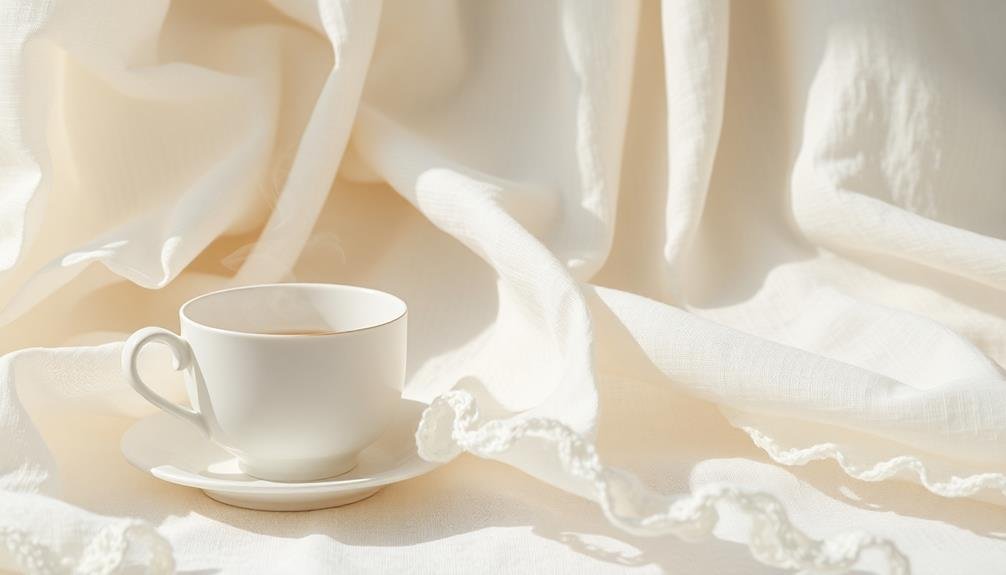
Organic cotton muslin is an excellent choice for eco-friendly tea bags. It's a lightweight, breathable fabric that allows hot water to flow through easily, extracting the full flavor of your tea leaves. You'll appreciate its natural, unbleached appearance and soft texture, which adds a rustic charm to your tea-making experience.
When using organic cotton muslin, you're ensuring that no harmful chemicals or pesticides come into contact with your tea. The fabric is durable and can withstand multiple uses, making it a sustainable option for reusable tea bags. You can easily wash and dry the muslin between uses, maintaining its integrity over time.
To create your tea bags, cut the muslin into small squares or circles, depending on your preferred shape. You'll find that the fabric is easy to work with and can be sewn or tied shut with minimal effort. The fine weave of muslin prevents tea leaves from escaping while allowing ideal infusion.
You can compost the used tea leaves and fabric together, as both are biodegradable. By choosing organic cotton muslin, you're making an environmentally conscious decision that enhances your tea-drinking ritual.
Unbleached Linen
Another excellent choice for natural tea bags is unbleached linen. This durable fabric is made from flax fibers and has been used for centuries due to its strength and versatility. When it comes to tea bags, unbleached linen offers several advantages that make it a popular option for eco-conscious tea drinkers.
You'll find that unbleached linen is highly absorbent, allowing for efficient steeping of your favorite tea leaves. It's also naturally antimicrobial, which helps keep your tea fresh and free from unwanted flavors. The fabric's tight weave prevents tea particles from escaping into your cup while still allowing water to flow freely.
Unbleached linen is biodegradable and compostable, making it an environmentally friendly choice. It's also reusable, so you can wash and reuse your tea bags multiple times before disposing of them.
When choosing unbleached linen for your tea bags, opt for a fine, smooth weave to guarantee the best brewing experience. You'll appreciate the subtle, earthy aroma that unbleached linen imparts, which complements many tea varieties without overpowering their natural flavors.
Hemp Fabric
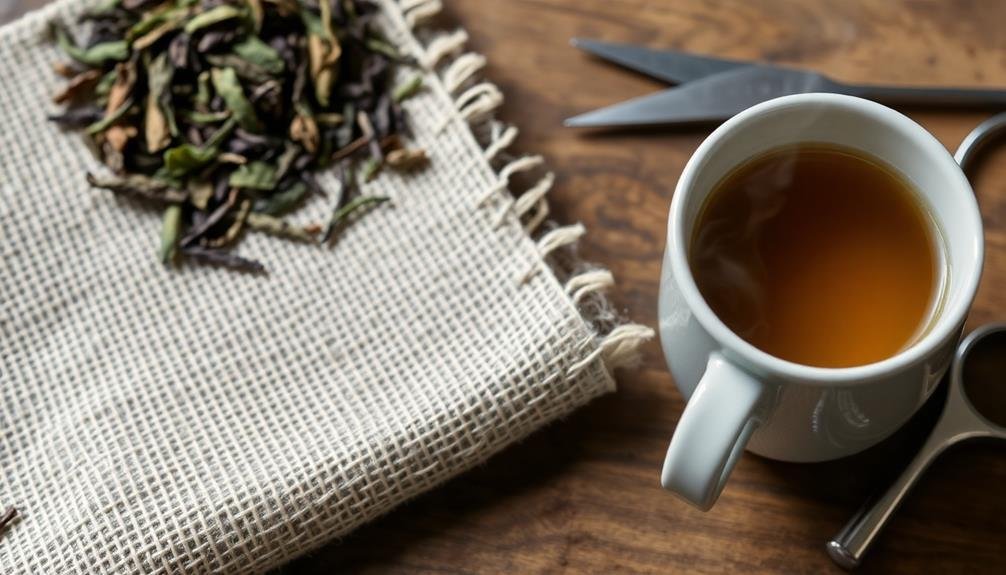
In recent years, hemp fabric has emerged as a sustainable alternative for tea bag production. You'll find that hemp is an eco-friendly choice, requiring minimal water and pesticides to grow. It's also biodegradable, making it an excellent option for environmentally conscious tea drinkers.
Hemp fabric offers several benefits for tea bags. It's durable, resistant to mold and bacteria, and doesn't impart any unwanted flavors to your tea. You'll appreciate its ability to withstand high temperatures without breaking down, guaranteeing a safe and enjoyable brewing experience.
Here's a comparison of hemp fabric to other common tea bag materials:
| Feature | Hemp | Cotton | Nylon | Paper |
|---|---|---|---|---|
| Biodegradable | Yes | Yes | No | Yes |
| Durability | High | Medium | High | Low |
| Flavor Neutral | Yes | Yes | No | Varies |
| Cost | Medium | Low | Low | Low |
When using hemp fabric for your tea bags, you'll need to ascertain it's food-grade and untreated. You can find hemp fabric in various weights, but a lightweight option is best for tea bags. Remember to pre-wash the fabric to remove any residues before use.
Bamboo Fiber Cloth
Bamboo fiber cloth has gained popularity as an eco-friendly material for tea bags. It's derived from bamboo plants, which grow quickly and require minimal pesticides.
When you're considering bamboo fiber cloth for your homemade tea bags, you'll appreciate its softness, durability, and natural antibacterial properties.
Bamboo fiber cloth offers several advantages for tea enthusiasts:
- Excellent filtration: The fine weave allows flavors to infuse while keeping tea leaves contained.
- Biodegradable: It breaks down naturally, reducing environmental impact.
- Reusable: You can wash and reuse bamboo tea bags multiple times.
- Temperature resistant: It withstands hot water without leaching harmful chemicals.
To use bamboo fiber cloth for your tea bags, cut it into small squares or circles. You'll find it easy to work with and sew.
Remember to rinse the cloth before first use to remove any residual manufacturing chemicals.
When brewing, you'll notice that bamboo fiber cloth allows for a smooth, clean taste without imparting any unwanted flavors to your tea. It's an excellent choice for those seeking a sustainable and high-performing material for their homemade tea bags.
Natural Silk Gauze
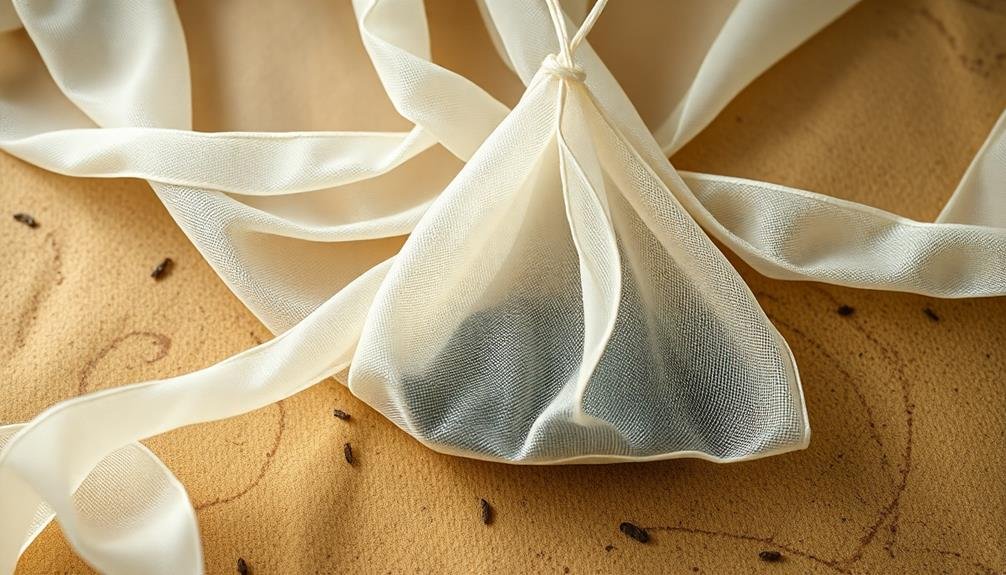
Elegance meets functionality with natural silk gauze as a tea bag material. This ultra-fine, lightweight fabric is derived from silkworm cocoons and offers a luxurious touch to your tea-drinking experience.
You'll find that natural silk gauze allows for excellent water flow while effectively containing even the finest tea leaves.
When using silk gauze for your homemade tea bags, you'll appreciate its smooth texture and ability to withstand repeated use. It's biodegradable and eco-friendly, aligning with sustainable practices.
The fabric's natural properties help preserve the tea's flavor and aroma, ensuring a pure taste with each brew.
You'll notice that silk gauze doesn't impart any unwanted flavors to your tea, unlike some synthetic alternatives. It's also hypoallergenic, making it suitable for those with sensitive skin or allergies.
When cleaning, simply rinse the tea bag with warm water and allow it to air dry.
While silk gauze may be pricier than other options, its durability and reusability make it a worthwhile investment for tea enthusiasts seeking a premium brewing experience.
You can find silk gauze at specialty fabric stores or online retailers catering to tea accessories.
Frequently Asked Questions
How Long Can Reusable Tea Bags Last Before Needing Replacement?
You'll find reusable tea bags can last 6-12 months with proper care. They'll need replacing when you notice fraying, staining, or lingering odors. Clean them thoroughly after each use to extend their lifespan and maintain freshness.
Are There Any Health Risks Associated With Using Homemade Tea Bags?
You shouldn't face major health risks with homemade tea bags if you use clean, food-safe materials. However, you'll need to guarantee proper cleaning and drying to prevent mold growth. It's best to replace them regularly.
Can I Use These Fabrics for Loose Leaf Teas and Herbal Blends?
Yes, you can use these fabrics for loose leaf teas and herbal blends. They'll work great for steeping your favorite tea varieties. Just make sure the fabric is clean and food-safe before using it to brew your beverages.
What's the Best Way to Clean and Maintain Homemade Tea Bags?
You'll want to rinse your homemade tea bags with cold water after each use. Don't wring them out; instead, gently squeeze excess water. Let them air dry completely before storing. For deeper cleaning, soak in mild soap occasionally.
Are There Any Teas That Shouldn't Be Used With Homemade Fabric Bags?
You shouldn't use finely ground teas or powders in homemade fabric bags, as they'll slip through the weave. Also, avoid using delicate or rare teas that require precise brewing. Stick to whole leaf or larger tea pieces for best results.
In Summary
You've now discovered five excellent natural fabric options for creating your own tea bags at home. Whether you choose organic cotton muslin, unbleached linen, hemp fabric, bamboo fiber cloth, or natural silk gauze, you'll be brewing eco-friendly, chemical-free tea in no time. Don't be afraid to experiment with different fabrics to find your favorite. By making your own tea bags, you're not only reducing waste but also ensuring a pure, natural tea-drinking experience. Enjoy your homemade brew!

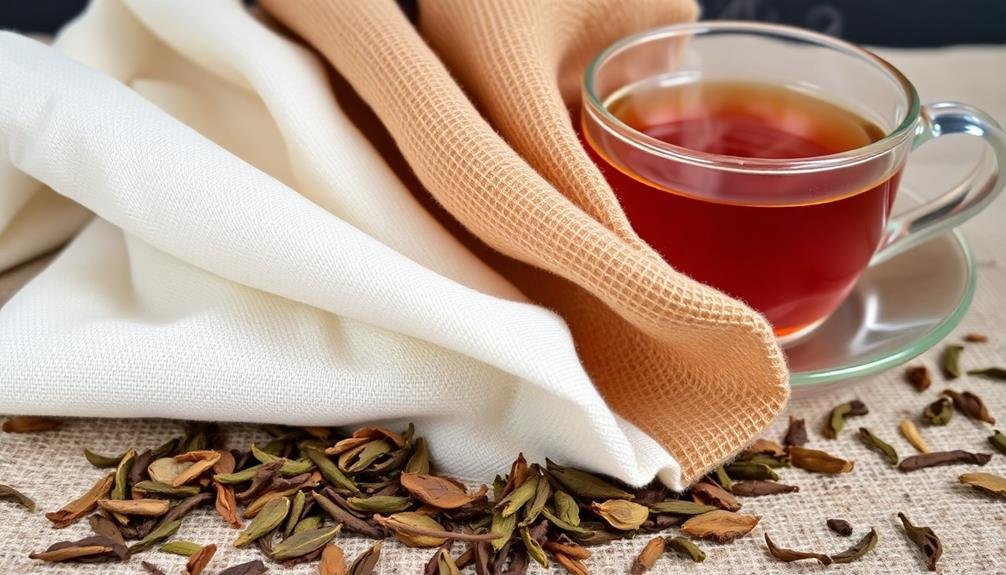
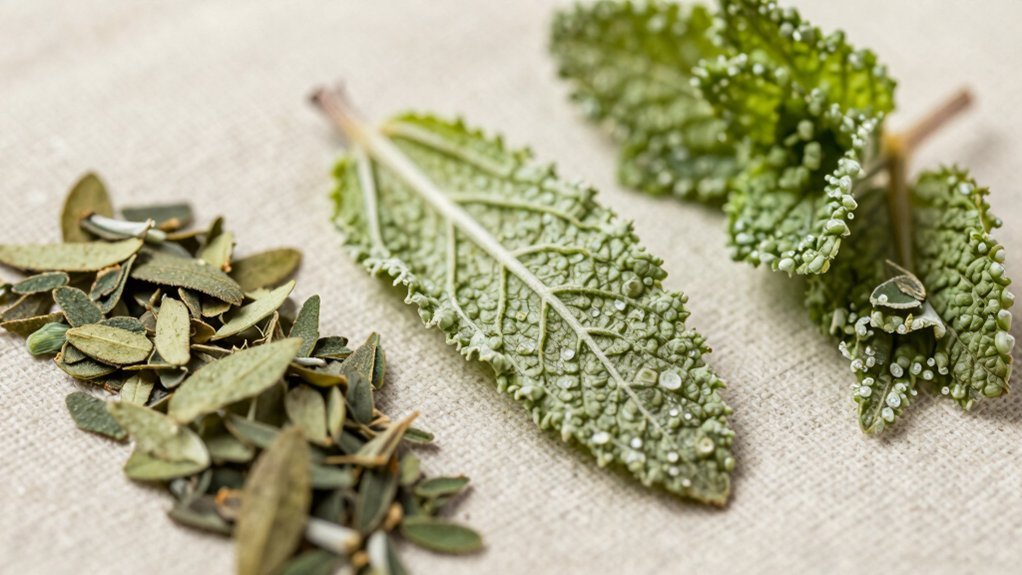

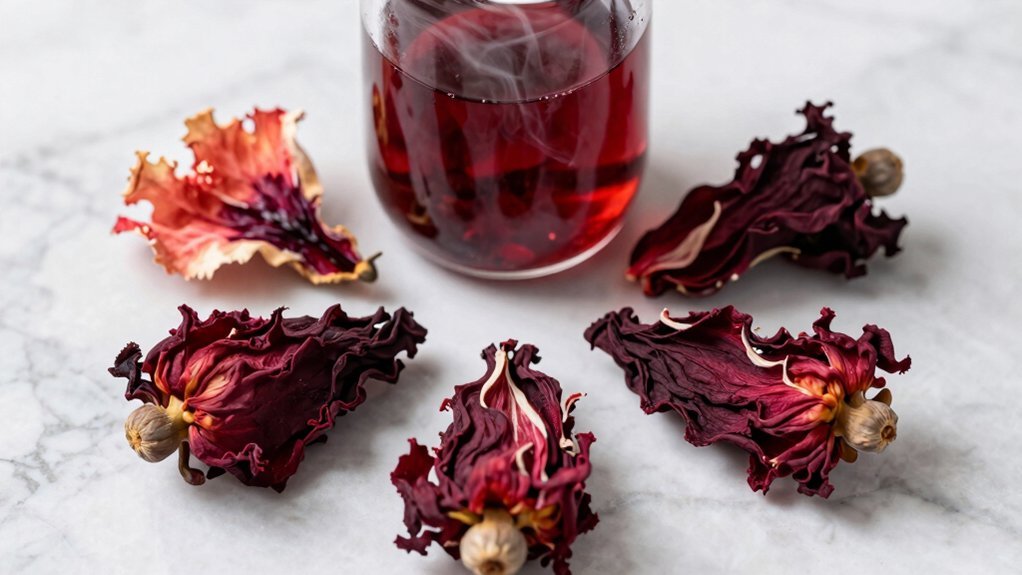
Leave a Reply